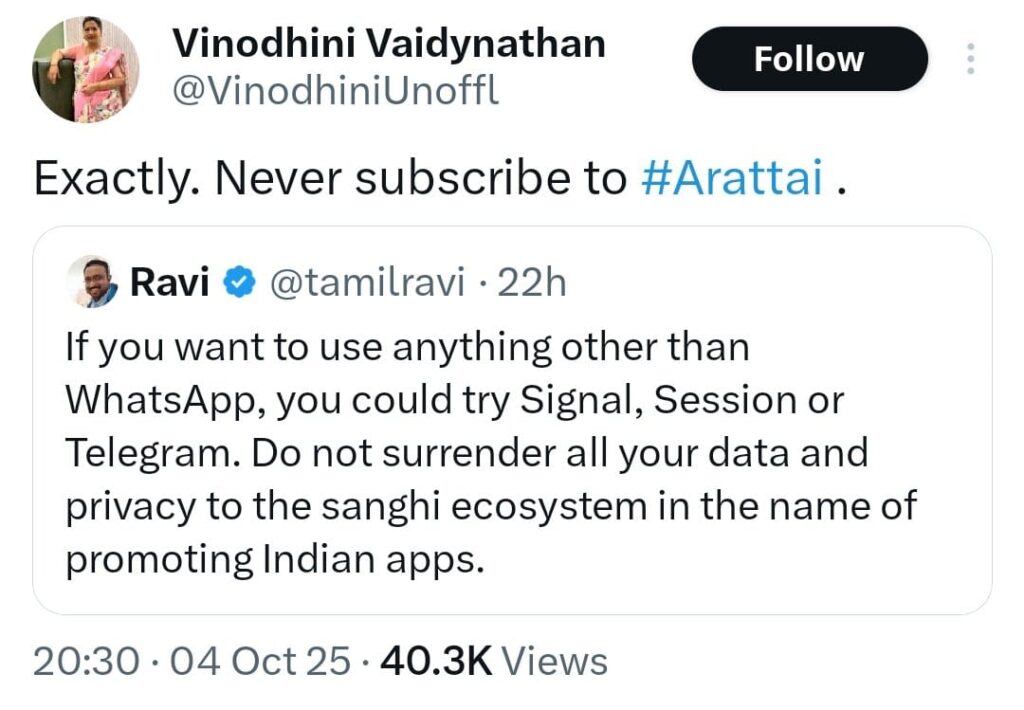We’re told time and again — India must become self-reliant, build its own apps, and trust its own data. But the moment an Indian company turns that dream into reality, the same ecosystem that mocks “Make in India” suddenly labels it “Bhakt,” “Sanghi,” or “Fascist Capitalist.”
And today’s story is exactly that — the story of Zoho’s Arattai app, which rose as a proud Indian alternative to WhatsApp, and simultaneously became an existential crisis for India’s left-liberal ecosystem.
The Rise of a Swadeshi Tech Vision
Zoho — a globally respected Indian software company — is known for its enterprise tools and strong data privacy ethics. In 2021, it launched Arattai, a Made in India chat app created during the pandemic to help Indian teams and offices communicate securely and seamlessly.
Its founder, Sridhar Vembu, left behind a comfortable life in the U.S. to live in rural Tamil Nadu. Today, he represents the very idea of India’s digital self-confidence. Arattai is now one of the most downloaded apps on both Google Play and Apple Store, with over 7.5 million downloads.
When Prime Minister Modi and several Union ministers encouraged the use of “Swadeshi digital tools” — with Arattai being one of them — the liberal outrage machine went into overdrive. Because suddenly, what was a “Made in India success” became “Made by Sanghis.”
The Liberal Backlash
A Dravidian X (Twitter) user named Ravi wrote: “If Zoho were owned by Samuel Johnson or Sheikh Abdullah, the Sanghis wouldn’t have promoted it in the name of national interest.”

Actress Vinodhini Vaidynathan, a known left-leaning Tamil voice, posted: “Exactly. Never subscribe to Arattai.”

Another user, Vishakha, added: “This Sridhar Vembu is an RSS supporter! The South has rejected him. Now the government is promoting his Zoho apps. Bahujans, don’t download these apps! Your money will go to RSS shakhas. Stay away from #Arattai.”
So, Arattai wasn’t just branded “Sanghi” — it was also called “Manuvadi.” The sharpest attacks came from Dravidian and Periyarist circles, raising a key question: Why are people from Sridhar Vembu’s own state — Tamil Nadu — so triggered by his success?
Why the Outrage Runs Deeper
There are several possible reasons. First, Vembu’s success story — building a global company from rural Tamil Nadu and creating local jobs — directly challenges the ideological foundation of Dravidian and Congress-linked politics. By empowering villages and strengthening Tamil youth, Zoho’s rural model threatens a long-standing dependency narrative — and, by extension, the conversion and NGO ecosystems that thrive on underdevelopment.
Here’s the irony: Sridhar Vembu, who runs rural coding schools, who says “India doesn’t need Silicon Valley; it needs its own soil,” is now labeled a “right-wing capitalist.” And why? Simply because he agrees with the idea that India should be technologically self-reliant. So if Elon Musk innovates, he’s a visionary. But if an Indian innovates, he’s a “Bhakt entrepreneur”?
The Tamil Nadu Irony
Here’s the real twist — while Dravidian supporters are running a campaign against Zoho’s Arattai, the DMK government itself is using Zoho software extensively!
- The Chief Minister’s Helpline initiatives like “Ungaludan Stalin” and “Ungal Thogudhiyil Stalin” use Zoho Desk to compile citizen grievance reports for the CM directly.
- StartupTN, Tamil Nadu’s state startup promotion body, uses Zoho Backstage for event registration and management.
- The Naan Mudhalvan skill development program uses Zoho Backstage for managing training modules — including Zoho Junior Functional Analyst training that teaches CRM and Help Desk tools.
Graduates from this program reportedly start with salaries around ₹20,000 per month.
So while the ecosystem trolls attack Arattai online, the same government quietly runs its digital infrastructure on Zoho platforms.
Shifting the Goalpost
When the ideological attacks failed, the narrative shifted again. Some said — “North Indians can’t even pronounce ‘Arattai’ properly!” Others tried to frame it as a Hindi–Tamil conflict, just to trigger online outrage. But notice the hypocrisy — if Sridhar Vembu is targeted for being “RSS-linked,” why isn’t Tony Thomas, Zoho’s co-founder (a Christian), being targeted too? Because the outrage isn’t about the app, it’s about the ideology.
This is the same ecosystem that takes selfies with Twitter’s Jack Dorsey and calls it “freedom of expression,”
but if an Indian tech founder appears with a minister, it’s suddenly “political infiltration.”
The Real Threat — Breaking the Myth
The truth is, Arattai and Zoho threaten a long-standing narrative — that “India cannot innovate.”
When that myth breaks, propaganda begins. This isn’t just a battle over a chat app — it’s a battle over narrative sovereignty.
The Indian government has already urged departments to shift to secure, Made-in-India platforms, and Zoho’s Arattai fits that mission perfectly. So the real question isn’t how good Arattai is — it’s whether India is ready to pay for its digital self-reliance with character assassination.
The New Meaning of “Swadeshi”
Once, “Swadeshi” meant our clothes and our tools. Today, it means our technology, our data, and our narrative.
If platforms like Arattai are targeted just because their founder has a certain belief system, then remember — we’re not just importing apps, we’re importing our mindset.









